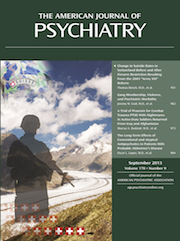Response to Ticlea et al.
To the Editor: I wish to thank Ticlea et al. for correcting the statement that there was no available guideline for the treatment of sleep disturbances comorbid with posttraumatic stress disorder (PTSD). Drs. Bajor, Ticlea, and Osser (1) have indeed suggested sensible and evidence-based guidelines for the management of nightmares and insomnia as the first decision point in the pharmacological treatment of PTSD in adults. Specifically, they recommend the use of prazosin and trazodone for nightmares and insomnia, respectively. They also offer additional recommendations in case of nonresponse.
Similar efforts to guide the management of sleep disturbances comorbid with PTSD using cognitive-behavioral strategies, or with the combination of pharmacological and psychological treatments, are lacking. As noted in the original article (2) and by Ticlea et al., the restoration of consolidated sleep, through pharmacological or psychological treatments, is likely to play a critical role in providing the neural milieu necessary to facilitate sleep-dependent learning processes involved in PTSD recovery.
1 : The Psychopharmacology Algorithm Project at the Harvard South Shore Program: an update on posttraumatic stress disorder. Harv Rev Psychiatry 2011; 19:240–258Crossref, Medline, Google Scholar
2 : Sleep disturbances as the hallmark of PTSD: where are we now? Am J Psychiatry 2013; 170:372–382Link, Google Scholar



